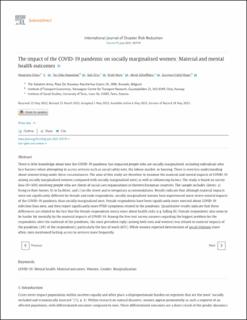| dc.contributor.author | Olson, Alexandra | |
| dc.contributor.author | Nævestad, Tor-Olav | |
| dc.contributor.author | Orru, Kati | |
| dc.contributor.author | Nero, Kristi | |
| dc.contributor.author | Schieffelers, Abriel | |
| dc.contributor.author | Meyer, Sunniva Frislid | |
| dc.date.accessioned | 2023-06-29T09:57:43Z | |
| dc.date.available | 2023-06-29T09:57:43Z | |
| dc.date.created | 2023-06-26T10:37:45Z | |
| dc.date.issued | 2023-05-06 | |
| dc.identifier.citation | International Journal of Disaster Risk Reduction. 2023, 93 (July 2023), 1-14. | en_US |
| dc.identifier.issn | 2212-4209 | |
| dc.identifier.uri | https://hdl.handle.net/11250/3074322 | |
| dc.description | Alexandra Olson, Tor-Olav Naevestad, Kati Orru, Kristi Nero, Abriel Schieffelers, Sunniva Frislid Meyer, The impact of the COVID-19 pandemic on socially marginalised women: Material and mental health outcomes, International Journal of Disaster Risk Reduction, Volume 93, 2023, 103739, ISSN 2212-4209, https://doi.org/10.1016/j.ijdrr.2023.103739 (https://www.sciencedirect.com/science/article/pii/S2212420923002194) | en_US |
| dc.description.abstract | There is little knowledge about how the COVID-19 pandemic has impacted people who are socially marginalised, including individuals who face barriers when attempting to access services such as social safety nets, the labour market, or housing. There is even less understanding about women living under these circumstances. The aims of this study are therefore to examine the material and mental impacts of COVID-19 among socially marginalised women (compared with socially marginalised men) as well as influencing factors. The study is based on survey data (N = 304) involving people who are clients of social care organisations in thirteen European countries. The sample includes clients: a) living in their homes, b) in facilities, and c) on the street and in temporary accommodations. Results indicate that although material impacts were not significantly different for female and male respondents, socially marginalised women have experienced more severe mental impacts of the COVID-19 pandemic than socially marginalised men. Female respondents have been significantly more worried about COVID-19 infection than men, and they report significantly more PTSD-symptoms related to the pandemic. Quantitative results indicate that these differences are related to the fact that the female respondents worry more about health risks (e.g. falling ill). Female respondents also seem to be harder hit mentally by the material impacts of COVID-19. Among the free text survey answers regarding the biggest problem for the respondents after the outbreak of the pandemic, the most prevalent reply (among both men and women) was related to material impacts of the pandemic (39% of the respondents), particularly the loss of work (65%). While women reported deterioration of social relations more often, men mentioned lacking access to services more frequently. | en_US |
| dc.language.iso | eng | en_US |
| dc.publisher | Elsevier | en_US |
| dc.rights | Navngivelse 4.0 Internasjonal | * |
| dc.rights.uri | http://creativecommons.org/licenses/by/4.0/deed.no | * |
| dc.subject | COVID-19 | en_US |
| dc.subject | Mental health | en_US |
| dc.subject | Material outcomes | en_US |
| dc.subject | Women | en_US |
| dc.subject | Gender | en_US |
| dc.subject | Marginalisation | en_US |
| dc.title | The impact of the COVID-19 pandemic on socially marginalised women: Material and mental health outcomes | en_US |
| dc.title.alternative | The impact of the COVID-19 pandemic on socially marginalised women: Material and mental health outcomes | en_US |
| dc.type | Journal article | en_US |
| dc.type | Peer reviewed | en_US |
| dc.rights.holder | © 2023 Published by Elsevier Ltd. | en_US |
| dc.source.articlenumber | 103739 | en_US |
| dc.description.version | publishedVersion | en_US |
| cristin.ispublished | true | |
| cristin.fulltext | original | |
| cristin.qualitycode | 1 | |
| dc.identifier.doi | 10.1016/j.ijdrr.2023.103739 | |
| dc.identifier.cristin | 2157865 | |
| dc.source.journal | International Journal of Disaster Risk Reduction | en_US |
| dc.source.volume | 93 | en_US |
| dc.source.issue | July 2023 | en_US |
| dc.source.pagenumber | 1-14 | en_US |

